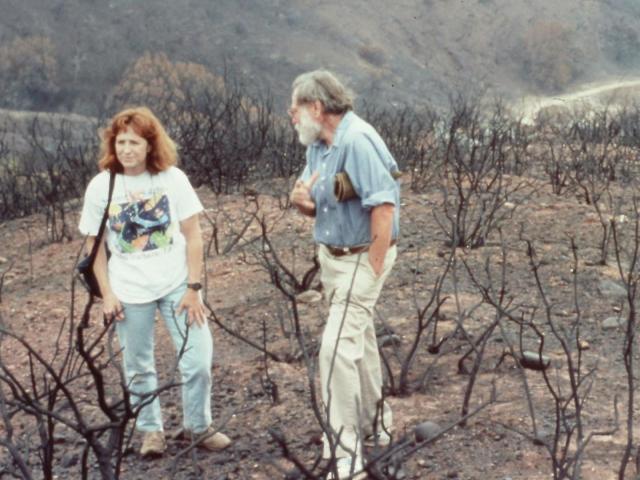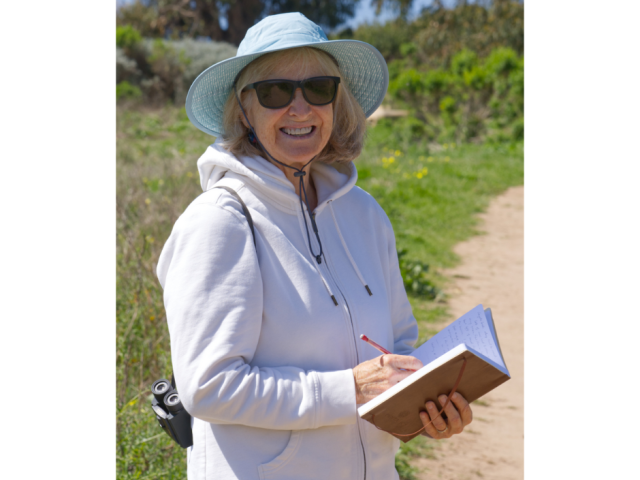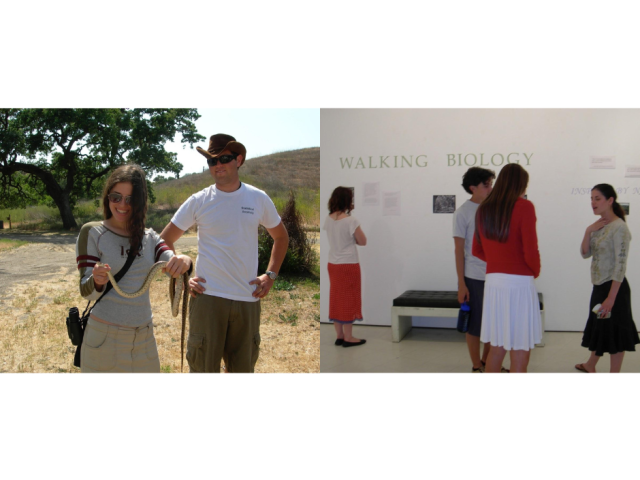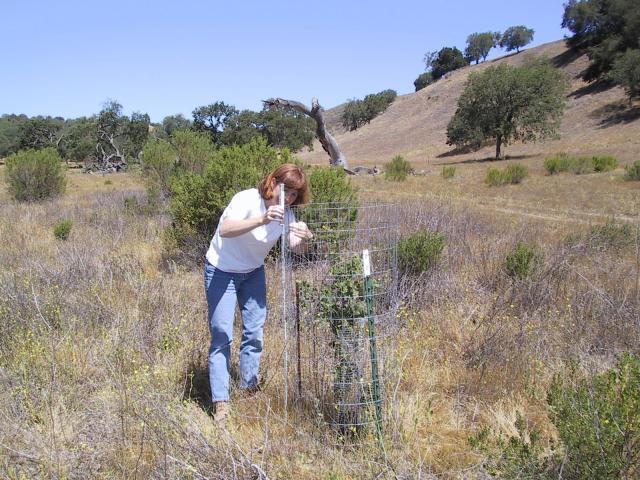A Spotlight on CCS Biology Faculty Emerita Claudia Tyler ‘91 ‘94 (UCSB M.A. Biology, Ph.D. Biology): 20+ Years Cultivating Curiosity Across Disciplines, Field-based Learning, and Encouraging Critical Thinking
The Journey Ahead: Dr. Tyler’s steadfast commitment to ecological research and awareness

“In my years in the College of Creative Studies I never had a meeting with Claudia where I did not leave both a happier and smarter human being. Claudia is such a dedicated and thoughtful teacher and mentor. She always encourages students to think big and she exudes the collaborative spirit of innovative thinking that is such a hallmark of our College. I look forward to many more adventures and collaborations in this new era. Congratulations Claudia!”
—Timothy Sherwood, Dean, College of Creative Studies
The College of Creative Studies (CCS) sat down with Dr. Claudia Tyler to celebrate her 20+ years of teaching and research on campus. Dedicated to furthering her research on the community dynamics in oak woodlands and other areas, she retired at the end of the 2024-2025 academic year. Over two decades at the University of California, Santa Barbara (UCSB), Claudia’s unwavering dedication to field-based learning, interdisciplinary studies, and mentorship led to generations of students across UCSB who have become scientists, activists, storytellers, and leaders in their fields and communities.
Claudia first came to UCSB as a graduate student to study ecology, receiving a M.A. in 1991 and Ph.D. in 1994 in biology. But, as many of us would not have assumed, Claudia was not an undergraduate biology major. A philosophy major. Yes…philosophy. Not biology. Claudia did start with biology at Wellesley College for a couple of years before gravitating toward philosophy. Later due to a somewhat circular learning journey, Claudia eventually went from “I hated biology” to “Oh My God, I do love biology!” She discovered a passion for ecology, she recalls, “...the area of biology that I really did love.” This ecologist is known for telling students—who think they are supposed to know exactly what they want to do—that it is okay to change your mind. “I did it,” Claudia said.
In 2014, Claudia received a UCSB Distinguished Teaching Award, a significant recognition of her deep commitment for the care and feeding of student learning and innovative teaching. She has received an accolade of grants and fellowships, including funding from the California Department of Fish and Wildlife, the Santa Barbara County Energy Division, and the University of California. Claudia was featured as one of 50 for 50 stories in 2017-2018, the year the College celebrated its 50th anniversary.
This is Claudia’s story.
The Ecologist’s Journey

Claudia first arrived at UCSB in the late 1980s as a graduate student in biology. She studied under Professor Joseph H. Connell, a renowned ecologist known for his field-based approach to science. Connell’s philosophy, “study nature, not books,” is echoed in her own: the process of getting out in the field, making pattern-based observations, and turning these into guiding questions. Before arriving at UCSB, she earned a B.A. in philosophy from Wellesley College with an emphasis on the philosophy of science and ethical issues in science and technology. Claudia later completed the equivalent of a biology degree at UC Berkeley before pursuing both her M.A. and Ph.D. in biology at UC Santa Barbara.
“This way of learning about the world, which I learned from Joe, is something I hope I have been able to pass along to my students,” she said. “To look closely without preconception and to cultivate curiosity and a desire to find things out.”

After earning her Ph.D., Claudia continued at UCSB as a postdoc as an Assistant Research Biologist, working with UCSB Professors Bruce Mahall and Frank Davis on an oak woodland project. Claudia spent six years conducting research in oak woodland ecology, but found herself missing the joy of teaching. In 2003, she learned about a lectureship to teach natural history and other biology courses at CCS. During her time at UCSB, she had mistakenly assumed CCS was only for students in the arts and humanities. “My dream was to do research half-time and teach half-time, especially field courses, so CCS seemed like a perfect fit,” she recalls. “And the more I learned about CCS, the more I wanted to be a part of it.”
Claudia shared her 2003 cover letter, part of her application for the lectureship, which still resonates with her today:
“I have two strong motivations in applying for this position. First, of all the courses I enjoy teaching, field biology classes are my favorite; to have the opportunity to help students learn about the natural world and develop an ability to pose and answer questions feels like a great privilege to me. Second, having received my college education at a liberal arts institution, I am a firm advocate of the experience available to students at the College of Creative Studies. CCS offers motivated undergraduates the benefits of a liberal arts college in its flexibility, its emphasis on close interactions with faculty mentors, and its encouragement of independent research, while providing the opportunities of a large renowned research institution. I believe I could be one additional asset to this outstanding program.”
Claudia was hired in 2004. She held a Continuing Lecturer split appointment at CCS and the College of Letters & Science (L&S). She taught in the CCS Biology program as well as in two L&S departments: Environmental Studies and Ecology, Evolution, and Marine Biology (EEMB).
Lasting Contributions
Over the years, Claudia made significant contributions to the CCS Biology program as well as in other areas at CCS and across campus. In addition to teaching Walking Biology in her first year, she also launched a two-quarter field course on experimental ecology and a seminar in conservation ecology. Over time, Claudia’s courses grew to include Introductory Biology, Field Studies in Experimental Ecology, Conservation Ecology, Ethical Issues in Science, Physiology of Stress, Ecology of Food, Soundscape Ecology, Music in Nature, and Writing in Nature.
Walking Biology

“If there was a dream course to teach, that [Walking Biology] would be it.”
—Claudia Tyler, CCS Biology Faculty Emerita
Upon arrival at CCS, Claudia was excited about the possibility of teaching the now famous and highly sought CCS Walking Biology course first taught in 1971, conceived by Professor Bea Sweeney. For Claudia, “If there was a dream course to teach, that would be it.” She became the third professor, following Professors Bea Sweeney and Cristina Sandoval, to ever teach the course open to students in all majors, not just biology students. While the general structure of the course has remained, each faculty member evolved the content around professional interests and experiences. Teaching the course for two decades, Claudia brought her expertise into the experiential learning ethos of this course.

“Claudia took over a classic CCS course, Walking Biology, initiated by one of the founding CCS Biology Faculty, Beazy Sweeney, and extended by Cristina Sandoval. Claudia took Walking Biology to a higher level, enabling hundreds of students who were not biologists to be able to see much more in the natural world that envelops us. Seeing a richer world enables all of them to understand and appreciate life on Earth. This is a very important contribution.”
—Armand Kuris, The Charles A. Storke II Chair in Ecology, Evolution and Marine Biology & Professor of Zoology, EEMB; CCS Biology Faculty
Intro to Biology Series

A major contribution to the CCS Biology program was due to Claudia’s recognition when she first arrived that the CCS Biology program needed some of its own ‘evolution’ and she set on a mission to do something about it. The College did not have an Intro to Biology course, requiring the biology students to take the huge Intro to Biology course in Campbell Hall [what used to be the largest learning faculty on campus!]. If the students took that course in the first quarter, CCS would give them a pass for the next two quarters. And, that general course offered in Campbell Hall, per Claudia, was not ideal for CCS students who were more interested “to dig in and do science” than memorizing facts.
“It has been a pleasure and a privilege to teach with Claudia for the best part of twenty years. I know this is a saying that has become cliched by its overuse but it is simply so appropriate here. It was my privilege to learn all about CCS from Claudia, to learn how to advise students, and how to best teach in this unique College. But most of all, it has simply been great fun to teach classes together and to always have an enthusiastic and thoughtful colleague with whom to brainstorm ideas.”
—John Latto, Teaching Professor of Ecology, Evolution and Marine Biology (EEMB) and CCS Biology
“So, three years later, when John Latto joined the CCS Biology Faculty, I suddenly saw the chance to create our own CCS Intro to Biology Series,” Claudia recalled fondly, “and it was really exciting. John’s been just a fantastic colleague.” With the new series in place, it enabled the CCS biology students to interact among like-minded peers and build a learning community via small group settings—one of the unique advantages of the College. This now-well-ingrained series is core to the CCS Biology program.
Experiential and Interdisciplinary
“Co-teaching with colleagues within and across disciplines—including with CCS Music Composition, Chemistry & Biochemistry, and Writing & Literature—has been a defining part of my academic life and CCS culture. I almost can’t believe my luck in having this opportunity and perhaps it’s unique to CCS.”
—Claudia Tyler, CCS Biology Faculty Emerita
This ecologist’s commitment to interdisciplinary education has resulted in an array of unique courses. Writing in Nature, a course developed with CCS Writing & Literature Faculty Kara Mae Brown, took students on an expedition through Santa Barbara's rich ecosystems, including Sedgwick Reserve, Santa Cruz Island, and Coal Oil Point where students record field observations and transform them into poetry, eco-fiction narratives, and interactive maps.
“This past Spring [2025] I had the opportunity to co-teach my dream class, Writing in Nature: Exploring Santa Barbara's Coasts, Valleys, and Sea with Claudia. Claudia led our group of mostly Writing & Literature students around Coal Oil Point, Sedgwick Reserve, and Santa Cruz Island, teaching us all along the way about the incredible ecology of these special natural spaces. I will never forget how, during our camping trip to Sedgwick Reserve, she and my daughter cooked breakfast for the group, cracking two dozen eggs into a huge pan. As I watched, I could see, distilled, everything that makes Claudia a remarkable educator—her patience, knowledge, wisdom, compassion, and, perhaps most importantly, joy for life. I'm incredibly grateful to say that I got to teach alongside her and learn from her too.”
—Kara Mae Brown, CCS Writing & Literature Faculty
In collaboration with CCS Music Composition Faculty Leslie Hogan, Claudia launched Music in Nature, a course that examines natural soundscapes or sounds produced by nature and then translates these into compositions inspired by the environment. For “Ethical Issues in Science Today,” a course focused on applications and practical ethical dilemmas, she partnered with CCS Chemistry & Biochemistry Faculty Leroy Laverman. The course invites students to grapple with the role of ethics in science through real-world case studies and debate with topics ranging from data fraud and conflicts of interest to environmental ethics and genetic engineering.
In Spring 2024, Claudia lent a hand with the course “Write on the Edge: A Workshop at Coal Oil Point,” led CCS Writing & Literature Faculty Kara Mae Brown and visiting American ecologist Marlene Zuk ‘77 (CCS Biology), Regents Professor, Department of Ecology, Evolution, and Behavior at the University of Minnesota. The interdisciplinary nature of the workshop provided students in different majors the opportunity to immerse themselves in the dynamic ecology of Goleta’s coastal intertidal zones and learn from one another while building connections and community. In 2026, Claudia will return to CCS to co-lead a similar workshop for students with Kara Mae and Marlene.
A Student-Centric Love for Teaching & Mentorship

“I remember when Claudia joined the CCS faculty in 2004. I was so excited that a colleague was willing to embrace the famous Walking Biology course and make it her own. And did she ever. This course on the natural history of our local Central Coast ranges is one I would take every year if I were a student (and wish I had taken it as a faculty member). I learned a lot from Claudia over the past 20+ years—not only from her scientific acumen and incredible powers of observation—but importantly, how to interact with students in ways that encompass understanding, empathy, and respect along with guidance and a requirement for critical thinking and self-discipline. I recall numerous CCS Biology mid residency reviews where Claudia would listen to a student's interests, challenges, and goals and come up with ideas and suggestions on the spot, leaving me thinking: ‘Wow, I would never have thought of that!’
Claudia was always willing to help out on any committee, brainstorming session or really, anything CCS needed, even though she was under no obligation. Her collaborative efforts on courses (such as bioethics) that appealed to all majors is just one example. Many of Claudia's contributions over the years were under the radar but incredibly valuable. For example, she played a major role in curriculum planning year after year and in developing strategies for helping students meet goals for graduation.
Adjectives that come to mind for Claudia: Excellent citizen. Great team player. Thoughtful. Insight/perspective (especially related to students). Altruistic.”
—Kathy Foltz, Professor Emerita of Molecular, Cellular, and Developmental Biology (MCDB) and CCS Biology; CCS Interim Dean (2016-2018)
This ecologist’s love for teaching and mentoring can be best summarized in moments: the feeling of satisfaction when sharing her passion with eager learners…the spark in the eyes of students as they engage in the process of discovery…and the mutual opportunity to both teach and be taught. As she fondly notes, “There’s nothing like being able to facilitate and witness a student’s excitement in experiencing something in the natural world for the first time—holding a gopher snake or octopus, seeing an island fox or baby owls, tasting a lemonade berry, hearing a pack of coyotes crying in the night or the dawn chorus—that’s just pure delight.”
On her evolution as an educator, she emphasizes a student-centric approach: “I think my core teaching philosophy has not changed significantly—to help students find their area of interest while cultivating curiosity across disciplines and encouraging critical thinking. I try to put myself in the place of my students and consider how the learning experience is going from their perspective.”
“I’ve been fortunate to have amazing, thoughtful mentors. The best way to honor them is to pay it forward. It’s a privilege to help guide someone toward their success, whatever that may be.”
—Claudia Tyler, CCS Biology Faculty Emerita
Over the years, she has continuously refined her teaching through UCSB’s instructional workshops and a commitment to updating her course materials. Her experience leading large lecture courses in EEMB and Environmental Studies, often with 200 to 300 students, sharpened her skills in course design, classroom engagement, and mentorship. These lessons found their way into her CCS courses that enriched the intimate, interdisciplinary environment she helped foster at the College.
Students who have taken one of her many courses share their sentiments in class reflections:
“A GEM!!!”
“Dr. Tyler is one of the sweetest professors at this university. She seriously tries her best to help students succeed in her courses.”
“Professor Tyler is my favorite professor I have ever had. Protect her at all costs!!”
“Professor Tyler has done an amazing job of making her class accommodating during the pandemic. Highly recommend!
“She's my favorite UCSB lecturer. Her lecturing charisma is seriously unmatched.”
“Dr. Tyler's the most adorable and charismatic speaker. Up close, she's warm and nurturing.”
“Maybe, instead of asking if she's a good enough professor for you, you should be asking if you're good enough for her. You cherish her.”
“She made me so much more knowledgeable and aware of conservation science.”
“She really cares about her students.”
“Professor Tyler is so fun and one of my favorite professors I've had at UCSB. She makes the material funny and interesting, and she is very passionate about ecology.”
“She's honestly the sweetest professor ever… taking her class has been really great for my mental health. She makes me want to attend her lectures, and the little things she does really just brightens up your day.”
“Claudia's the best. She's a sweet mother-like figure who's crazy passionate about nature and wants her students to succeed! She's all about being in the field, so we had a few sections on the beach.”
Whether collaborating with colleagues to demystify letters of recommendation or guiding students in the field, Claudia is motivated by a deep commitment to mentorship, shaped by the generosity of her own mentors. She and colleague CCS Biology Faculty John Latto often walk students through the purpose of recommendation letters, how to choose a recommender, and how to make the ask. Claudia and John also collaborate by preparing students for those interested in pursuing scholarly endeavors. They have led an annual colloquium on navigating the graduate school application, including information on the National Science Foundation Graduate Research Fellowship Program (GRFP). Over 70 percent of CCS students in STEM majors pursue advanced degrees at the masters and doctoral levels straight after completing their undergraduate degrees with these faculty playing a key role in preparing future scientists and leaders.
“Claudia: Involved, Innovative, Imaginative, Interdisciplinary, Inquisitive—a colleague with an insatiable curiosity and commitment to the kind of Intellectual activity that typifies those associated with CCS. Claudia is never content to do one thing, to offer one course, or even more to the point, to offer the same course. Rather she is committed - or it is driven - to poking and prodding in the corners of biology and its intersection with other disciplines, all with the intent of opening the eyes of students to the interconnectedness of life and knowledge. Walking Biology is of course legendary, but she partnered with colleagues in music and physics in courses exploring sound in biology and created other courses on her own like The Ecology of Food and (suitable for over-achieving college students) The Physiology of Stress. All while quietly pursuing her own research on Oak Woodlands ecology.”
In this same spirit of active inquiry Claudia was a great colleague in the classroom—bringing new insights and ideas with each iteration of a course and always willing to prod and question students and fellow faculty alike. Claudia really typified the spirit of CCS—pushing, questioning, and enjoying the process of pressing against the unknown. It is sad to reflect on the passage of time and the realization that gifted instructors move on, but the spirit of CCS created by the presence of instructors, like Claudia, is immortal.”
—Bruce H. Tiffney, Professor Emeritus, Department of Earth Sciences and CCS Biology; CCS Dean (2005-2016)
The Journey of Exploration & The Road Ahead
“I absolutely love spending time outdoors, especially in these systems, trying to understand the organisms and patterns I see.”
—Claudia Tyler, CCS Biology Faculty Emerita

Over the years, Claudia found herself increasingly drawn to her research. While she will miss teaching, she is excited to devote her time to ecological research. “I hope I never give up teaching and mentoring, even if it’s not official,” Tyler said. “I see those two activities as an important way to share and to give back. As a lecturer, one’s teaching load is high. So in the past couple decades, my research has been my weekend and evening hobby.”
Some of the same research questions she worked on as a graduate student with Professors Bruce Mahall and Frank Davis on oak woodland continue to energize her field research. Her research centers on the processes that influence the structure and dynamics of oak woodlands and chaparral shrublands. Since the 1990s, she has studied these systems closely, driven by a deep love for fieldwork and the scientific process: framing questions, testing hypotheses, collecting observations, analyzing findings, revising questions, and raising new ones.

For this ecology enthusiast, there is joy and excitement to be found even in the unexpected developments. To summarize this adoration, she alludes to Robert Sapolsky’s quote in Why Zebras Don’t Get Ulcers:
“I love science, and it pains me to think that so many are terrified of the subject or feel that choosing science means you cannot also choose compassion, or the arts, or be awed by nature. Science is not meant to cure us of mystery, but to reinvent and reinvigorate it.”
Claudia’s other research projects range from oak physiology to manzanita shrub seed germination. “The goal for me is to get these, and hopefully more, to print,” she says with commitment. “For me, the research is not done until it is published and shared with the scientific community.” However, this longtime dedicated faculty member is careful not to overshadow the beauty of the road to discovery. She quotes author Rachel Carson:
“Those who dwell, as scientists or laymen, among the beauties and mysteries of the earth are never alone or weary of life....Those who contemplate the beauty of the earth find reserves of strength that will endure as long as life lasts.”
This journey of exploration, defined by hands-on field research and aha moments, is one that Claudia has spent her career walking alongside her students. We look forward to checking in on her and—perhaps—be lucky enough to stumble into her during one of her magical coastal field explorations.
Source of Images: Claudia Tyler and College of Creative Studies